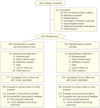Docosahexaenoic acid supplementation and cognitive decline in Alzheimer disease: a randomized trial
- PMID: 21045096
- PMCID: PMC3259852
- DOI: 10.1001/jama.2010.1510
Docosahexaenoic acid supplementation and cognitive decline in Alzheimer disease: a randomized trial
Abstract
Context: Docosahexaenoic acid (DHA) is the most abundant long-chain polyunsaturated fatty acid in the brain. Epidemiological studies suggest that consumption of DHA is associated with a reduced incidence of Alzheimer disease. Animal studies demonstrate that oral intake of DHA reduces Alzheimer-like brain pathology.
Objective: To determine if supplementation with DHA slows cognitive and functional decline in individuals with Alzheimer disease.
Design, setting, and patients: A randomized, double-blind, placebo-controlled trial of DHA supplementation in individuals with mild to moderate Alzheimer disease (Mini-Mental State Examination scores, 14-26) was conducted between November 2007 and May 2009 at 51 US clinical research sites of the Alzheimer's Disease Cooperative Study.
Intervention: Participants were randomly assigned to algal DHA at a dose of 2 g/d or to identical placebo (60% were assigned to DHA and 40% were assigned to placebo). Duration of treatment was 18 months.
Main outcome measures: Change in the cognitive subscale of the Alzheimer's Disease Assessment Scale (ADAS-cog) and change in the Clinical Dementia Rating (CDR) sum of boxes. Rate of brain atrophy was also determined by volumetric magnetic resonance imaging in a subsample of participants (n = 102).
Results: A total of 402 individuals were randomized and a total of 295 participants completed the trial while taking study medication (DHA: 171; placebo: 124). Supplementation with DHA had no beneficial effect on rate of change on ADAS-cog score, which increased by a mean of 7.98 points (95% confidence interval [CI], 6.51-9.45 points) for the DHA group during 18 months vs 8.27 points (95% CI, 6.72-9.82 points) for the placebo group (linear mixed-effects model: P = .41). The CDR sum of boxes score increased by 2.87 points (95% CI, 2.44-3.30 points) for the DHA group during 18 months compared with 2.93 points (95% CI, 2.44-3.42 points) for the placebo group (linear mixed-effects model: P = .68). In the subpopulation of participants (DHA: 53; placebo: 49), the rate of brain atrophy was not affected by treatment with DHA. Individuals in the DHA group had a mean decline in total brain volume of 24.7 cm(3) (95% CI, 21.4-28.0 cm(3)) during 18 months and a 1.32% (95% CI, 1.14%-1.50%) volume decline per year compared with 24.0 cm(3) (95% CI, 20-28 cm(3)) for the placebo group during 18 months and a 1.29% (95% CI, 1.07%-1.51%) volume decline per year (P = .79).
Conclusion: Supplementation with DHA compared with placebo did not slow the rate of cognitive and functional decline in patients with mild to moderate Alzheimer disease.
Trial registration: clinicaltrials.gov Identifier: NCT00440050.
Figures



Comment in
-
Treatment of Alzheimer disease and prognosis of dementia: time to translate research to results.JAMA. 2010 Nov 3;304(17):1952-3. doi: 10.1001/jama.2010.1625. JAMA. 2010. PMID: 21045105 No abstract available.
-
Docosahexaenoic acid supplementation and Alzheimer disease.JAMA. 2011 Feb 16;305(7):672; author reply 673. doi: 10.1001/jama.2011.140. JAMA. 2011. PMID: 21325181 No abstract available.
References
-
- Kalmijn S, Feskens EJ, Launer LJ, Kromhout D. Polyunsaturated fatty acids, antioxidants, and cognitive function in very old men. Am J Epidemiol. 1997;145(1):33–41. - PubMed
-
- Kalmijn S, Launer LJ, Ott A, Witteman JC, Hofman A, Breteler MM. Dietary fat intake and the risk of incident dementia in the Rotterdam Study. Ann Neurol. 1997;42(5):776–782. - PubMed
-
- Morris MC, Evans DA, Bienias JL, et al. Consumption of fish and n-3 fatty acids and risk of incident Alzheimer disease. Arch Neurol. 2003;60(7):940–946. - PubMed
-
- Lim WS, Gammack JK, Van Niekerk J, Dangour AD. Omega 3 fatty acid for the prevention of dementia. Cochrane Database Syst Rev. 2006;(1):CD005379. - PubMed
Publication types
MeSH terms
Substances
Associated data
Grants and funding
LinkOut - more resources
Full Text Sources
Other Literature Sources
Medical

